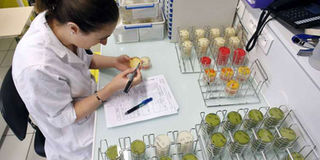To develop, continent needs more women to take up science

A scientist looking for microbiological pathogens in samples of water in the organic chemistry unit of the Laboratoire Eau de Paris in Ivry-sur-Seine on July 5, 2012. PHOTO | AFP
What you need to know:
- Today, there are few women scientists in Africa; the proportion of women in the research field is 29 per cent for the whole of Sub-Saharan Africa, while it exceeds 45 per cent in Tunisia and Egypt.
- In Kenya, out of a population of 48 million people, 300 people get a PhD every year, and only 75 of them are women.
“For an ever greater and better support towards women scientists in Africa”
Africa is a continent of incredible richness, creativity and diversity. By 2050, the continent will have more than two billion inhabitants despite facing challenges such as climate regulation, poverty or scarcity of resources. Her growth cannot be achieved without acknowledging the role of science, technology and innovation in solving the challenges that she faces.
There is need for the continent to invest in science. Equally, it is crucial that African countries prioritise gender diversity in the process and appreciate the role that women can play in the development of scientific solutions to address these issues at the local level.
Today, there are few women scientists in Africa; the proportion of women in the research field is 29 per cent for the whole of Sub-Saharan Africa, while it exceeds 45 per cent in Tunisia and Egypt. In Kenya, out of a population of 48 million people, 300 people get a PhD every year, and only 75 of them are women. At least 5 per cent of researchers are women.
WANING HOPES
In West Africa, only 8 per cent of research laboratories are led by women.
These startling numbers are waning hopes of young women who desire to build a career in science for lack role models.
It is therefore essential to support and highlight African researchers in science, technology, engineering or even mathematics; the continent needs their talents.
For 20 years, the L'Oréal Foundation and Unesco have globally highlighted and awarded 102 women scientists for their work, three of them have received a Nobel Prize.
This joint program calls For Women in Science, and has been rolled out in many parts of the world in the form of fellowships, has honoured more than 3,100 women scientists in 110 countries.
For 9 years, a regional program for Sub-Saharan Africa has been supporting young female researchers from the continent, providing them with the much needed financial support to accelerate their work.
FACE OBSTACLES
For the first time this year, the program also offered them a leadership training to equip them face the obstacles they will inevitably encounter in their careers.
On December 6, 14 young women scientists from Ghana, Kenya, Mauritius, Nigeria and South Africa were honoured during this year’s award ceremony that was held in Nairobi.
From this group of exceptional talent, new approaches to treating tuberculosis, building climate resilience systems for small coffee growers, research to preserve bee colonies or even better understanding of chemical interactions on mosquitoes were presented. These are just some of the research studies that go a long way in inspiring those who want to shape the world through science and invent solutions to face the world’s challenges.
As part of L’Oreal’s partnership with UNESCO, the company will increase the number of scholarships to African women scientists in the years to come, so that they receive the recognition they deserve.
The world needs science, Africa in particular needs science and science needs women. That is our belief.
The writer is Vice-President Executive The L’Oreal Foundation




